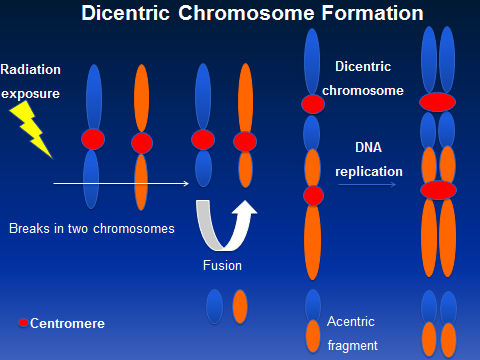Cytogenetic Biodosimetry Laboratory
By operating a cytogenetic biodosimetry laboratory (CBL), the Oak Ridge Institute for Science and Education is helping the U.S. Department of Energy close a critical gap in our nation’s ability to respond to a radiological or nuclear incident. The use of radiation for medical, industrial, research, and other applications raises the risk of accidental human exposure. In addition, the growing threat of radiological/nuclear terrorism poses a serious risk to human health and welfare.
What is cytogenetic biodosimetry?
Cytogenetic biodosimetry is a proven technique that can be used to help calculate the absorbed radiation dose in exposed individuals. Information on individualized radiation dose assists in better treatment decisions and better management of valuable emergency response resources.
The CBL at the Radiation Emergency Assistance Center/Training Site (REAC/TS) performs the individualized radiation dose assessment using the “gold standard” dicentric chromosome assay. Currently, the CBL is the only federally funded facility certified by Clinical Laboratory Improvement Amendments (CLIA) to provide absorbed radiation dose in exposed humans. The CBL has been successful in obtaining the ISO 9001 certification for quality and performance each year. The REAC/TS CBL is one of the actively participating laboratories in annually conducted international exercises that are designed to evaluate the competency and proficiency of radiation dose assessment.

Dicentric chromosome assay is the "gold standard" for radiation dose assessment in exposed humans. The ORISE Dicentric Chromosome Challenge game provides an opportunity for interested individuals to learn about identifying/scoring dicentric chromosomes for radiation dose estimation. You can evaluate your efficiency in dicentric chromosome scoring by playing the game! Are you ready to challenge yourself?
Play the game!Recently, the CBL has initiated the development of high throughput platforms for many of the cytogenetic applications and novel biomarkers, which will enable rapid dose assessment of individuals in case of mass casualty incidents. The CBL is fully equipped to perform state-of-the-art techniques, such as multicolor fluorescence in situ hybridization (FISH), which are useful for monitoring and predicting the long-term effects of ionizing radiation in exposed individuals (see example below).

How does cytogenetic biodosimetry work?
When energy generated by ionizing forms of radiation is transferred to human cells and tissues, damage is induced in the chromosomal DNA depending on the amount of absorbed radiation energy.
Several types of chromosomal aberrations can be induced by ionizing radiation exposure. One type of aberration is known as a dicentric chromosome, which is formed by a fusion of two chromosomes with centromeres after DNA breakage. The dicentric chromosome formation has been shown to be highly specific for radiation exposure. Since the yield of dicentric chromosomes depends on radiation dose, absorbed whole body dose can be estimated from the frequency of dicentric chromosomes fitted to a standard calibration curve generated with known doses of radiation.

The dicentric chromosome assay enables ORISE’s cytogenetics researchers to quantify chromosomal DNA damage and provide an accurate dose estimate for patients who may require immediate and specialized medical care. This valuable tool allows decision makers and public health officials to assess the magnitude of exposure for better allocation of available medical resources in the aftermath of mass casualty incidents.
Video Series: Dicentric Chromosome Assay
Dicentric Chromosome Assay (DCA) is the gold standard for estimating the absorbed dose in humans after occupational, incidental, and accidental exposures to ionizing radiation. The REAC/TS Cytogenetic Biodosimetry Laboratory has created a series of instructional videos on DCA with a purpose of transferring the technique to academicians, clinical laboratorians, and medical professionals across our nation to enhance the DCA capability resources for an effective triage after large-scale radiological/nuclear incidents.
Part 1: Introduction
Part 2: Blood Collection
Part 3: Cell Culture
Part 4: Harvesting & Chromosome Separation
Part 5: RNase Treatment & Chromosome Staining
Part 6: Dicentric Chromosome Scoring
Part 7: Generation of Calibration Curves
Part 8: Absorbed Dose Estimation
Video Spotlight
Cytogenetic Biodosimetry Laboratory
REAC/TS' Cytogenetic Biodosimetry Laboratory is a critical resource in the event of mass casualties involving radiological or nuclear materials. Information on individualized radiation dose assists in better treatment decisions and more effective management of valuable emergency response resources.
What is dicentric chromosome assay?
Dicentric chromosome assay is a valuable tool that allows decision makers and public health officials to assess the magnitude of exposure for better allocation of resources. The process allows ORISE’s cytogenetics researchers to quantify chromosomal DNA damage and provide an accurate dose estimate for patients who need immediate and specialized medical care.



